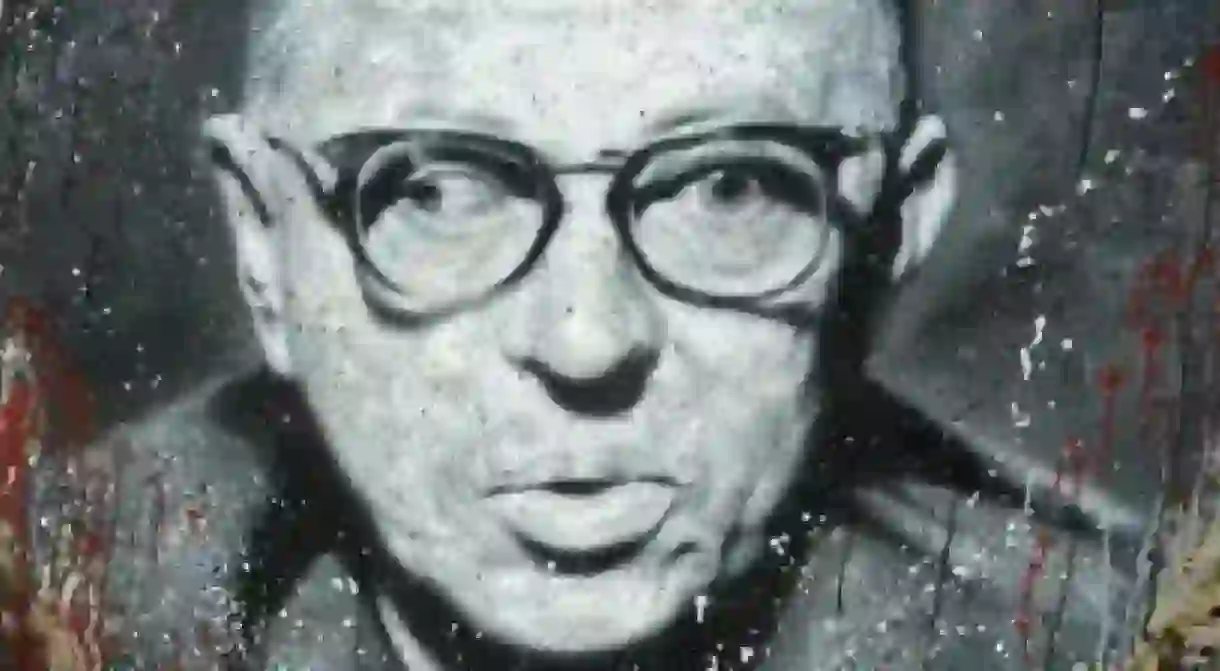The Best Books by Jean-Paul Sartre You Should Read

Born in Paris in 1905, Jean-Paul Sartre, the French author and philosopher, was the pioneer of existentialism and one of the most influential thinkers of the 20th century. Sartre’s musing on critical theory and literature were of world-wide significance, and the impact of his thinking was recognized in 1964 when he was awarded the Nobel Prize for Literature. The author, however, refused this coveted accolade, the first person ever to do so, declaring his desire not ‘to be turned into an institution’.

La Nausée
Sartre’s first novel, La Nausée, was published in 1938. This book is widely considered the most authentic representation of Sartre’s existentialist thought. The work centers around the character of an historian, troubled by the idea that his existence means absolutely nothing to most situations and inanimate objects. La Nausée, or Nausea, suggests that human freedom to act is our own curse, or the sickening ‘nausée‘ feeling of the novel’s title, due to the disorientation we feel faced with the fact that there is no higher power, no leading purpose to our existence. We are entirely responsible for our actions, and this knowledge fills us with dread, represented through the protagonist’s spiral down into existentialist angst, hopelessness in the thought of his existence, and near insanity. The novel is Sartre’s most famous.
L’Être et le néant
Meaning ‘Being and Nothingness’, L’Être et le néant is an essay discussing the issues and complexities of human existence. Sartre earned a degree in philosophy, and this essay is replete with the deep metaphysical thinking that gained this writer his reputation. Released in 1943, this book is an introduction to Sartre’s earliest existentialist thinking. Existentialism proposes the theory that there is no creator: human beings have not been designed with any specific nature, therefore we are entirely responsible for our own actions. L’Être et le néant is therefore mainly concerned with demonstrating the existence of human free will. Personal responsibility for our actions may explain why Sartre often chose to defy social expectations of his bourgeois upbringing and refused to conform to society’s norms. This rejection of conformity for a more authentic life is a dominant theme of his early work, and Sartre’s use of writing as a form of resistance against the Nazi Occupation of France is also linked to this rejection.

Les Mouches
Written in 1943, Les Mouches is a hugely influential play, and Sartre’s first. The symbolism of Sartre’s plays reflect his thinking, and Les Mouches, meaning ‘The Flies’, is a prime example of this. The drama follows two protagonists of Ancient Greek mythology, Electra and Orestes, as they attempt to avenge their father, King Agamemnon, murdered by their mother and her new husband. The key existentialist idea of human freedom comes through strongly in Les Mouches, where Orestes must take responsibility for his own hand in the murders of the book. Written during the Second World War, this moral and political drama explores the idea of our own guilt in the choices we make. Rejecting responsibility in the play results in characters being plagued by swarms of flies – a symbol of guilt and punishment.
Les Mains Sales
This political drama was first performed in 1948. Les Mains Sales, meaning ‘Dirty Hands’, discusses the issues of being a politically active intellectual. The events of the novel are triggered by the assassination of a politician and the murderer’s own explanation of why he committed the act. Hugo, a young Communist, decides to murder the party leader when he betrays the party’s principles, collaborating with enemy classes. The play explores the human dilemma of sacrificing one’s ideology in favor of pragmatism. Hugo accepts his human freedom to act as he wishes and get his ‘hands dirty’ with the murder. The play is often labelled ‘anti-Communist’. Sartre himself was a Marxist but criticized the Soviet Union for its human rights abuses . He had strong political principles, and upon meeting Che Guevara declared him to be “the era’s most perfect man”.
Huit Clos
Huit Clos, or ‘No Exit’, completed in 1944, is another of Sartre’s world-famous plays which illustrates the philosopher’s theories in action. Hell is the play’s setting, where each of the three main characters is trapped, although here ‘hell’ is portrayed as a banal sitting room with three sofas. As the characters attempt to discern what deeds they committed to earn their place in hell, they become each other’s torturers, providing the very torment of hell themselves. The play ends with the famous quotation ‘hell is other people’. The hell of Sartre’s play has also been likened by many to Paris under Nazi rule, and Huit Clos has been called a social commentary on the situation at the time.
Les Mots
This 1964 autobiography is both a cynical and witty reflection on literature and the early years of Sartre’s own life. Les Mots examines Sartre himself, and his development through existentialist angst and the sense of hopelessness of man’s meaningless existence to the use of art and creative activity to inspire hope. Sartre’s simple style makes for clear yet beautiful reading. Sartre’s own interpretation of his early years represents his theory that we as humans place our own significance on things and give them an ‘essence’. This book is a perfect demonstration of the development of Sartre’s philosophy, and illuminates much of the thinking and theories with which he influenced so many. This prisoner of war, Marxist, philosopher, literary critic, and political activist, has impacted on so many spheres of society, and the legacy left by his books continues to do so today.














